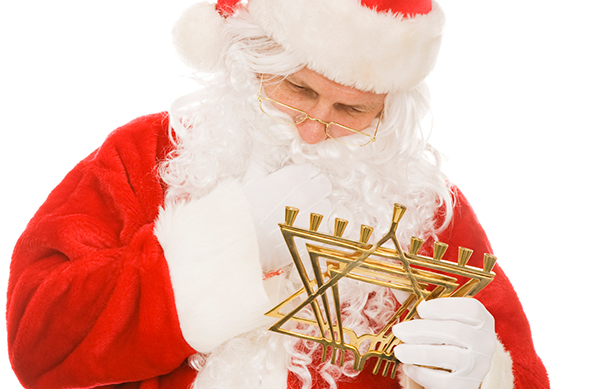Ho-Ho Hanukkah! How to Balance Hanukkah and Christmas Celebrations
 Many interfaith families choose to observe both Hanukkah and Christmas. In fact, holiday joy can be doubled when you choose to light the menorah and decorate the Christmas tree to honor the cultural and religious traditions of both parents. So, don’t stress over the “December Dilemma!” When it comes to religion, families increasingly run the Judeo-Christian gamut. In our family, we have Orthodox Jews on one side of our family tree and Born-again Christians on the other. However, my husband and I both share the same beliefs about diversity, tolerance, and spirituality; and that’s what we intend to pass on to our daughter, in part by participating in both signature holidays.
Many interfaith families choose to observe both Hanukkah and Christmas. In fact, holiday joy can be doubled when you choose to light the menorah and decorate the Christmas tree to honor the cultural and religious traditions of both parents. So, don’t stress over the “December Dilemma!” When it comes to religion, families increasingly run the Judeo-Christian gamut. In our family, we have Orthodox Jews on one side of our family tree and Born-again Christians on the other. However, my husband and I both share the same beliefs about diversity, tolerance, and spirituality; and that’s what we intend to pass on to our daughter, in part by participating in both signature holidays.
As a woman who was raised Catholic and has been happily married to a Jewish man for the past thirteen years, I can attest that, once you become the parent in an interfaith family, you quickly become accustomed to not being able to please everyone. But since the wisdom of your hearts brought you and your partner together in the first place, why not call on that same source of wisdom to guide you through creating your own version of happy holidays? Here are a few tips based on what our family has learned over the years:
Talk To Each Other First & Last.
The bottom line on family celebrations, holiday or otherwise, is to always do whatever you and your spouse deem best for your family. The only way to come to an understanding about what this means is to discuss it with each other first and last. Be prepared for this to be an ongoing conversation, and probably one that you revisit each year.
Protect Your Joint Point of View.
Never let opinionated family members horn in on conversations that rightly belong between you and your partner. You only have one spouse, and that’s the person whose opinion you should value most. Your kids come next and, perhaps, the grandparents after them. Don’t treat your parents like children or allow them to treat you like a child either. This behavior will only create conflicts.
Ignore Disapproving Outsiders.
Never apologize for being an interfaith family, even if extended family members or friends do not approve of your union. You are not seeking their permission, as Perchick expressed so boldly in Fiddler On The Roof, you are asking for their blessing. Creating harmonious and joyful dual holidays in your own home is your parental right and your familial duty, even if it means agreeing to disagree with select loved ones.
Stick To Separate But Equal.
Christmas may be more common and commercial than Hanukkah, but don’t let that trump your holiday fun or cherished traditions. The nice thing about Hanukkah is that it lasts for eight nights. You can light the menorah candles and say the Hanukkah prayer each night and you may be amazed at how inspiring such simple ritual can be, even on busy school nights. Look for the quieter, more awe-inspiring moments in Christmas as well, such as ending the day admiring the beauty of the decorated tree or window lights.
Keep Both Sets of Traditions.
At our house, we celebrate as much of both traditions as we can, without a worry about whether the holidays overlap or not. For me, this means the Christmas tree, presents, cookies, and big dinner. For my husband, it means lighting two menorahs for eight nights (one for him and one for my daughter), having our daughter’s friends over for potato latkes, and some dreidel games.
Don’t Double Your Gift Budget.
We make an effort to celebrate the bounty of two holidays without going overboard. Your kids’ friends may consider them “lucky” because they assume that they get double the gifts. However, that’s not necessarily the case at our house. Our daughter typically gets a little present on the first day of Hanukkah and a bigger present on the last day of Hanukkah. One set of grandparents send a couple of little Hanukkah gifts and a check, and the other sends a couple of stocking stuffers and a check. The amount of gifts she receives is essentially the same as it would be if we only celebrated one holiday.
Share the Love.
Another thing we enjoy about dual holidays is that our daughter can share traditions about both holidays with her friends and loved ones, no matter what religion they follow, exposing them to a culture they may not have had the opportunity to learn about.
Participate Wisely.
When invited to join a new or old tradition on either side of the family, give the ritual a chance. We will try just about anything once, but we reserve the right to say no to pressure or anything that makes us uncomfortable. Maintaining an atmosphere where you can say yes or no to your parents without stern chastisement may not come easily in your extended family system. But start trying it or you’ll never get there.
Honor the Choices of Others.
We don’t try to protect our family members from our choices. They need to be exposed to what we value if we expect them to understand and accept our choices. However, we also try to respect the choices that our family members make without imposing our life choices on them. The Jewish families get Happy Hanukkah cards and the Christian families get Christmas cards. When we cross over, we go with “Happy Holidays.” After all, isn’t that what it’s all about? Happy Holidays!









